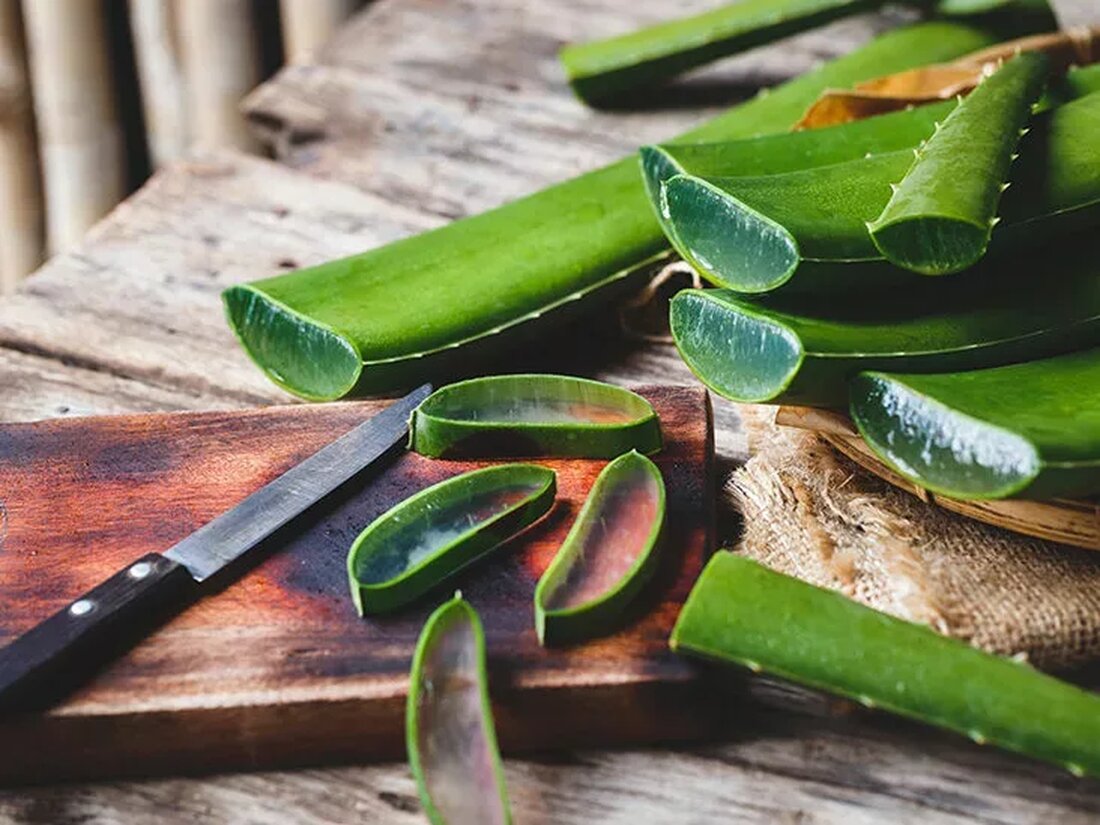Aloe Vera - New research results - nutrients, possible uses, cultivation, and much more. - from 32 sources!
Although the plant's aloe vera gel is known for its ability to take the sting and heat away from a sunburn, the beneficial properties of aloe vera, Aloe barbadensis, extend far beyond the skin. Ancient peoples used this soothing plant for a wide range of applications, from controlling irritation to keeping wounds clean to relieving gastrointestinal disorders. New research shows that aloe vera's healing abilities may be more numerous than previously thought. It has a wealth of health-promoting compounds that provide benefits to almost all of the body's systems. ((Link removed)) What nutrients does Aloe Vera contain? Although you may not be interested because of his...

Aloe Vera - New research results - nutrients, possible uses, cultivation, and much more. - from 32 sources!
Although the plant's aloe vera gel is known for its ability to reduce the sting and warmth of a sunburnwithdraw, the beneficial properties of aloe vera range from Aloe barbadensis, far beyond the skin. Ancient peoples used this soothing plant for a wide range of applications, from controlling irritation to keeping wounds clean to relieving gastrointestinal disorders. New research shows that aloe vera's healing abilities may be more numerous than previously thought. It has a wealth of health-promoting compounds that provide benefits to almost all of the body's systems. ((link removed))
What nutrients does aloe vera contain?
Although you might not think of it for its nutritional properties, aloe vera is an all-star superfood. It contains a wide range of essential nutrients and beneficial plant substances. At this point, approximately 75 different nutrients have been identified. ((link removed))
Vitamins in Aloe Vera
- Vitamin A (Beta-Carotin): Ein fettlösliches Vitamin, das das Immunsystem, das Sehvermögen, die reproduktive Gesundheit und die chemische Kommunikation zwischen Ihren Zellen unterstützt. ((Link entfernt))
- Vitamin C : Ein Antioxidans, das an einer gesunden Immunfunktion, Kollagensynthese und Wundreparatur beteiligt ist. ((Link entfernt))
- Vitamin E: Ein fettlösliches Antioxidans, das die Genexpression reguliert und die Entwicklung von Herz-Kreislauf-Erkrankungen hemmen kann. ((Link entfernt))
- Vitamin B12 : AB-Vitamin, das an einer gesunden kognitiven Funktion, der Alterung des Gehirns, der DNA-Synthese und der Produktion roter Blutkörperchen beteiligt ist. ((Link entfernt))
- Folat: Ein weiteres B-Vitamin, das zur Umwandlung von Aminosäuren und zur Bildung von DNA beiträgt. ((Link entfernt))
Minerals in Aloe Vera
- Calcium: Ein Makromineral, das an der Knochenstärke, der Kontraktion der Muskeln und den Stoffwechselfunktionen beteiligt ist. ((Link entfernt))
- Chrom: Ein Spurenelement, das für den Blutzuckerhaushalt und die Immunfunktionen verantwortlich ist. ((Link entfernt))
- Kupfer: Ein Cofaktor, der an der Freisetzung von Energie, der Entwicklung bestimmter Gewebe und der Übertragung von Nervenimpulsen beteiligt ist. ((Link entfernt))
- Selen : Ein Spurenelement, das zur Immunabwehr beiträgt, beispielsweise zur Regulierung des Zellwachstums und des Zelltods. ((Link entfernt))
- Magnesium: Ein Cofaktor, der an der Funktion von Hunderten von Enzymen beteiligt ist, einschließlich solcher, die am Glukosestoffwechsel, der Proteinsynthese, dem Kalziumhaushalt und der Blutzuckerregulation beteiligt sind. ((Link entfernt))
- Mangan : Ein wesentlicher Bestandteil eines wichtigen körpereigenen antioxidativen Enzyms – Mangansuperoxiddismutase. ((Link entfernt))
- Kalium: Ein kritischer Mineral- und Elektrolyt, der sich mit Nervenimpulsen, Muskel- und Herzkontraktionen befasst. ((Link entfernt))
- Natrium: Ein weiterer Elektrolyt, der an Muskelfunktion und Nervenimpulsen beteiligt ist. ((Link entfernt), (Link entfernt))
- Zink: Ein Spurenelement, das an Wachstum, Entwicklung, Fortpflanzung, Gehirnfunktion und Stoffwechsel beteiligt ist. ((Link entfernt))
Phytonutrients in Aloe Vera
Although these are not required under government guidelines, an overwhelming body of evidence suggests that many of these botanicals support excellent health. Aloe Vera contains many phytonutrients that are involved in the immune response to damaged tissue, both surface and internal. ((link removed), source 2)
Some of these phytonutrients include:
- Acemannan
- Lignane
- Saponine
- Sterole
- Anthrachinone
Enzymes in Aloe Vera
Aloe vera contains at least eight different types of enzymes – alliinase, alkaline phosphatase, amylase, bradykinase, carboxypeptidase, catalase, cellulase, lipase and peroxidase. Bradykinase can reduce skin swelling and irritation when applied to the skin. Some of the other enzymes can help the body break down nutrients in the digestive tract and even cause the recycling of damaged tissue within the body itself. ((Link removed), (Link removed))
In addition, catalase, an enzyme found in most organisms, protects cells from oxidative damage, which is involved in many diseases, as well as the aging process of the body. ((Link removed), (Link removed), Source 3)
Health Benefits of Aloe Vera
There are extensive benefits that come from regular use and even consumption of aloe. These effects extend from the skin inward to your circulatory system. From here they can travel through the body and thus promote health.
Part of a healthy anti-aging diet
As you have already seen, aloe vera is full of micronutrients such as antioxidants that slow down the aging process at the cellular level. But that's just the tip of the aloe iceberg. A study of women aged 45 and over found that eating aloe itself improved skin elasticity, increased collagen production and significantly reduced wrinkles. Although the study was small, it found that both sun-damaged and sun-protected skin had better appearance. ((link removed))
Balances blood composition for cardiovascular health
Some studies have shown that aloe vera supports normal blood sugar. Researchers reported that 5 active ingredients in aloe vera reduced fasting blood sugar levels in mice by up to 64% when consumed for four weeks. The same mice showed a 15% decrease in A1C blood sugar levels. This is significant because high blood sugar increases the presence of free radicals in the blood. It also increases damage to LDL cholesterol, which can lead to arterial plaques and the development of heart disease. ((Link removed), (Link removed), (Link removed))
Even better, consuming aloe can support healthy fat levels in the blood. Some research has shown that aloe vera promotes normal LDL cholesterol and triglyceride levels. ((Link removed), (Link removed))
Stimulates the immune system
Acemannan, one of the active ingredients in aloe vera, provokes the production of proteins that strengthen your body's defenses against foreign or old, faulty cells. It also promotes greater specialization in your dendritic cells, the immune cells that call the police - other immune cells - when they see suspicious activity in their neighborhood. ((link removed))
In an animal study, researchers discovered that eating aloe vera helps the body naturally increase the number of red and white blood cells after aggressive medical treatments that suppress them. ((link removed))
Encourages wound repair
Aloe vera powder and gel are a common addition to natural skin products and cosmetics as they nourish, moisturize and protect the skin. Knowledge of these skin benefits has been widespread for centuries, dating back to ancient Indian, Roman, Greek, Iberian and Arabic folk medicine. Today, aloe is still used for relatively minor skin problems such as unpleasant sunburn, but it can also soothe scratches, burns, rashes and other skin wounds. (Source)
Several studies have confirmed that it supports the healing of skin wounds and stimulates cell rejuvenation. Aloe plant gel contains several different plant compounds that help promote normal skin health. Aloe enzymes support the production of collagen and help your body break down damaged tissue in wounds, while glycoproteins in the gel create the conditions for new skin cell proliferation. Additional research has shown that it shortens healing time as well as first and second degree burns. In human studies, aloe vera gel has been found to improve skin integrity in dry, cracked skin and reduce irritation, wrinkles, and irritation due to injury. (Source 1, (link removed), (link removed))
Supports oral health
Aloe gel also promotes gum and tooth health. It soothes swollen gums and protects them from irritating germs. A study found that swishing aloe gel in your mouth is just as effective - if not more - at cleaning your mouth than commercial mouthwashes. ((Link removed), (Link removed))
Promotes digestion and intestinal health
Another study shows that aloe vera can help your stomach naturally cleanse itself of harmful organisms to promote greater comfort. It also helps the cells in your stomach lining increase mucous production to insulate it from stomach acid. Because of this protective effect, aloe is included in some ulcer medications. ((Link removed), (Link removed))
Aloe not only benefits stomach health, but also promotes intestinal health. The acemannan in aloe is a complex sugar that you can't digest, similar to fiber, but your microbiota thrives on it. Nurturing the friendly bacteria in your gut with prebiotics like acemannan not only helps maintain your gastrointestinal health, but also lays the foundation for your overall health and well-being. ((Link removed), (Link removed))
Protects you from oxidative stress
Aloe gel itself contains several antioxidants such as vitamins C and E, selenium and some phytonutrients that actively scavenge the free radicals that cause oxidative damage and accelerate the aging process. (Source 1, (link removed))
Notably, the gel also helps your body produce antioxidants. One of your most powerful antioxidant scavengers are produced by the body, such as superoxide dismutase (SOD) and glutathione, which neutralizes superoxides. Consuming aloe gel helps your body increase production of these cunning chemical allies that protect you from oxidative damage. (Source)
Inhibits the growth of harmful organisms
Your hygiene and the foods you eat are powerful determinants of how your body interacts with your microbiota - and how this, in turn, affects your health. Acemannan's prebiotic potential strengthens your natural defenses against harmful, opportunistic organisms that can affect your health when your immune system is weakened or otherwise occupied, or when repairing other injuries.
Fortunately, aloe not only promotes the growth and health of beneficial probiotic colonies, but also suppresses colonies of harmful organisms in the skin, injuries, stomach, and intestinal lining. (Source 1, (link removed), (link removed))
The best forms of aloe vera and where to buy it
The benefits of adding aloe vera to your diet are obvious. Make this superfood part of your daily routine with its many vital nutrients and benefits. Many people grow aloe plants at home so that they always have access to this incredible medicinal plant. It is easy to care for and is a staple in the kitchen and grows very easily.
For those looking for the convenience of something that can be used immediately, many aloe vera products such as aloe vera juice, aloe vera gel, and supplements are available online and in stores.
When taking aloe vera in any form, the nutritional content and bioavailability of key components such as acemannan and other phytonutrients should be your primary concern.
As you can see, Aloe Vera is a real natural remedy that has so many nutrients. And it looks like it helps with almost all problems.

 Suche
Suche
 Mein Konto
Mein Konto
